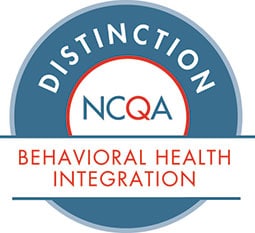What exactly is “therapy”?

Rhiannon Moore, MA, PSYD
Post written by Rhiannon Moore, MA, PSYD
Licensed Psychologist
Assistant Behavioral Healthcare Director
What do you picture when someone says “psychotherapy”?
Many people are likely to picture the stereotypical image of a patient lying on a couch spilling out his/her deepest, darkest secrets to a therapist who primarily responds by nodding or writing on a clipboard.
You might also conjure up movie clips of therapists exploring childhood memories and toxic relationships with mothers.
In reality, the term “therapy” encompasses a number of therapeutic activities and interventions intended to improve overall health and well-being.
In recognition of National Psychotherapy Day on September 25, Health Partnership Clinic’s behavioral health team wants to address these and other misconceptions about therapy to assist you in seeking help if needed.
Psychotherapy, or therapy, involves the treatment of mental health concerns and behavioral problems through communication, relationship factors, and skill building by a qualified mental health professional.
Factors addressed in therapy include social skills, relationships, coping with stressors, managing symptoms, addressing thoughts and behaviors contributing to symptoms, lifestyle factors and more.
 Therapists may be psychologists (doctorate level providers) or other master’s level providers such as a licensed clinical social worker. Therapy can assist individuals dealing with:
Therapists may be psychologists (doctorate level providers) or other master’s level providers such as a licensed clinical social worker. Therapy can assist individuals dealing with:
- Grief/Loss
- Attention-Deficit/Hyperactivity Disorder (ADHD)
- Bipolar Disorder
- Major Depressive Disorder (MDD)
- Post-Traumatic Stress Disorder (PTSD)
- Relationship or Family Problems
- Personality Disorders
- Self-harm or Suicidal Thinking
- Substance Abuse
- And many other conditions
The choice of a therapist is an important one with many considerations that should not be made lightly. A positive working relationship between therapist and patient is one factor which best predicts a successful therapy outcome. When choosing a therapist, you should consider:
- Personal factors
- Are you more comfortable speaking to a male or female?
- Is the age of the therapist important to you?
- Is the race/ethnicity/nationality of the therapist important to you?
- Are there personality quirks that would make it difficult for you to work with and/or trust the therapist?
- Financial factors
- Does the therapist accept insurance?
- Does your insurance plan cover mental health services? If so, is the therapist in-network with your insurer?
- Are you willing/able to pay out of pocket? If so, what forms of payment are accepted?
- Is the therapist willing/able to offer sliding scale discounts, pro-bono services, or out-of-network benefits if needed?
- Educational/licensing factors
- Is the therapist currently licensed to practice in your state?
- In Kansas, check here: https://www.kansas.gov/bsrb-verification/
- Has the therapist ever been disciplined for inappropriate practicing?
- In Kansas, check here: https://www.kansas.gov/bsrb-verification/
- Ask the therapist about his/her education, training experiences and continuing education.
- Does the therapist specialize in the problem you are attempting to address?
- Does the therapist have experience working with individuals from diverse backgrounds?
- Does the therapist practice a type of therapy that is evidence-based?
- Is the therapist currently licensed to practice in your state?
- Feasibility factors
- Is the location easily accessible/convenient, safe, clean?
- Do the office hours work with your schedule?
- Is it easy to reach the therapist or other staff by phone?
- Does the therapist and/or staff speak your preferred language? If not, are they able to offer interpretive services?
 Another important factor to consider in choosing a therapist is the modality or treatment approach from which he or she practices. Various treatment approaches are recommended for certain conditions/problems.
Another important factor to consider in choosing a therapist is the modality or treatment approach from which he or she practices. Various treatment approaches are recommended for certain conditions/problems.
Additionally, you might personally prefer one approach versus another. The various modalities differ in frequency of sessions, session length, number of sessions, time commitment, therapist interactions, and patient activities.
Evidence-based modalities are those supported by research which have been proven to work when applied correctly for certain types of problems. Evidence-based approaches include but are not limited to:
- Cognitive-Behavioral Therapy (CBT)
- Recommended for various conditions including MDD (depression), PTSD, ADHD, and anxiety
- Dialectical Behavior Therapy (DBT)
- Recommended for personality disorders, especially Borderline Personality Disorder
- Solution-Focused Brief Therapy
- Recommended for depression (including suicide and self-harm), anxiety, and health-related conditions (i.e. diabetes, smoking cessation, etc.)
- Acceptance and Commitment Therapy (ACT)
- Recommended for older adolescents and adults with various mental health concerns
- Trauma-Focused CBT (TF-CBT)
- Recommended for PTSD and other trauma-based disorders
- Play Therapy
- Recommended for children and adolescents aged 3-13 with ADHD, PTSD, depression, anxiety, suicidal ideation, self-harm ideation, and more
- Eye Movement Desensitization and Reprocessing (EMDR)
- Recommended for PTSD
- Systemic Family and Couples Therapy
- Recommended for couples and/or families struggling with relationships, interactions, parenting, behavior management, etc.
- Applied Behavior Analysis
- Recommended for children and adolescents with Autism Spectrum Disorder and other developmental/neurological and behavioral/mental health conditions
- Psychodynamic Therapy
- Recommended for various populations and presenting problems
Before starting therapy, determine which approach best fits your needs. There are several options for locating a therapist near you, including:
- Calling your insurance provider to obtain a list of covered therapists
- Checking with your employer’s Employee Assistance Program (which may include several therapy sessions free of charge or at a reduced cost)
- Asking for personal recommendations from loved ones or from another health care provider
- Using therapist-locating websites such as psychologytoday.com.
At Health Partnership Clinic, the Behavioral Health team offers integrated behavioral health services, utilizing evidence-based CBT and brief solution-focused techniques.
In this format, interventions take place in medical exam rooms to address a variety of mental and physical health behaviors/conditions. This type of therapy is not long-term but occurs in “episodes of care” or “on-demand” when patients present to address medical and psychological concerns with their primary care provider.
We are happy to assist in locating other specialists which may meet diverse needs not addressed within this setting/format.
To schedule an appointment at our clinic, call 913-648-2266.






